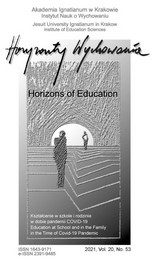Ponowoczesny romantyzm jako nurt ideowy określający horyzonty współczesnego człowieczeństwa
Post-modern Romanticism as an Ideological Framework that Has Defined the Horizons of Contemporary Humanity
Author(s): Magdalena ZdunSubject(s): Cultural history, Social Philosophy, Social history, Social development, Post-War period (1950 - 1989), Transformation Period (1990 - 2010), Present Times (2010 - today)
Published by: Uniwersytet Ignatianum w Krakowie
Keywords: humanity; culture; postmodernism; romanticism;
Summary/Abstract: RESEARCH OBJECTIVE: The goal of this analysis is to provide conceptual descriptions of future humanity models. The article will also reflect on the contemporary human condition in the cultural context of postmodernism. For the purposes of this paper, that context will be referred to as postmodern romanticism. RESEARCH PROBLEM AND METHODS: At the core of this study is a model of humanity developed on the basis of ‘axiological present-day antinomies’. Based on these antinomies, postmodern culture can be compared to the models typical of 19th century romanticism. As a result, humanity can be described through internal conflicts between such notions as transience vs immortality, selfactualisation vs sacrifice, consumption vs work, and vita activa vs vita contemplativa. This paper is a sociological theoretical analysis. It relies on postmodern research methodology. And as such, it uses metaphor and archetype to ultimately describe the horizons of humanity. PROCESS OF ARGUMENTATION: This study has three parts. The first introduces the labyrinth metaphor as the primary exploration and assessment tool. It helps identify the basic tensions in humans and find the leading narrative that underlies contemporary humanity. This narrative is postmodern romanticism. Stage two identifies the types and characteristics of the postmodern romantic narrative. This lays the groundwork for the third part, which employs the category of archetype. This concept serves to explore the models of humanity fostered by the postmodern romantic narrative. RESEARCH RESULTS: The primary results of this analysis are the postmodern models of humanity embodied by the Prometheus, Orpheus, Icarus, and Narcissus archetypes. A detailed assessment of these helps identify such fundamental movements in humanity development as transhumanism, individualism, and imaginarism. In addition, each model is examined to identify its limitations and the related risks. CONCLUSIONS, INNOVATIONS, AND RECOMMENDATIONS: The final conclusions and recommendations follow from the analysis of postmodern romanticism. That philosophy can be perceived as having two forms, ideological and vulgarised, or processed by the popular culture. The former describes the opportunities offered by the model that builds on it, while the latter focuses on the related risks.
Journal: Horyzonty Wychowania
- Issue Year: 20/2021
- Issue No: 53
- Page Range: 103-116
- Page Count: 14
- Language: Polish

